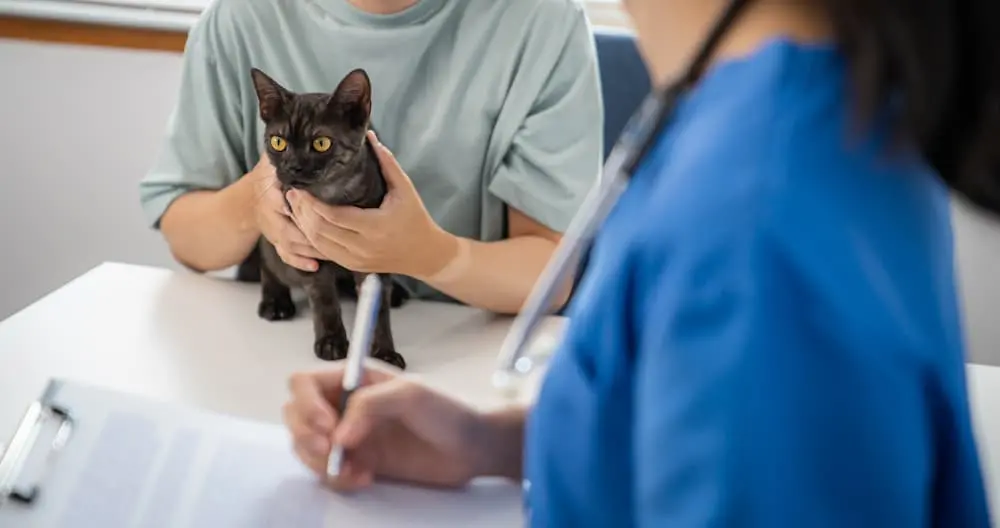Cats can be masters of disguise, especially when it comes to hiding signs of illness. As a cat owner, it’s crucial to know the subtle signs that indicate your feline friend might not be feeling well. This guide will help you understand how to tell if your cat is sick, recognize sick cat symptoms, and what steps you can take to ensure their well-being.
Signs & Symptoms of a Sick Cat
Identifying a sick cat can be challenging. Unlike humans, cats are adept at masking their pain and discomfort. However, there are certain signs and symptoms you can look out for:
- Changes in Behavior: A normally sociable cat becoming withdrawn or a typically independent cat suddenly becoming clingy can be indicative of illness.
- Altered Eating and Drinking Habits: Any significant change in appetite or thirst—whether an increase or decrease—can be a sign of sickness.
- Vomiting and Diarrhea: While occasional vomiting might not be a cause for alarm, frequent or chronic vomiting and diarrhea are serious signs.
- Respiratory Symptoms: Cat coughing, wheezing, or labored breathing can suggest respiratory issues.
- Changes in Activity Level: Increased lethargy or a noticeable decrease in activity can be a sign that your cat isn’t feeling well.
- Altered Grooming Habits: Over-grooming or lack of grooming can both be indicators of an underlying issue.
- Weight Changes: Sudden weight loss or gain should always be checked by a veterinarian.
- Changes in Urination or Defecation: Difficulty using the litter box, changes in the frequency of urination or defecation, or any blood in urine or feces are all concerning signs.
Common Causes of Illness in Cats
There are numerous potential causes of illness in cats, ranging from simple dietary indiscretions to more serious chronic diseases. Some common causes include:
- Infections: Bacterial, viral, or fungal infections can affect various parts of the body, such as eye and ear infections.
- Chronic Diseases: Conditions like diabetes, hyperthyroidism, or kidney disease often develop in older cats.
- Parasites: Internal parasites like worms or external parasites like fleas and ticks can cause various symptoms.
- Poisoning: Accidental ingestion of toxic substances can lead to sudden illness.

Knowing When Your Cat is Sick
Understanding the nuances of your cat’s normal behavior, appearance, and habits is key to recognizing when something might be amiss. Here’s what to look out for:
What changes would I see in the overall appearance of my cat?
A sick cat may appear less kempt than usual. Look for any signs of uncharacteristic untidiness, such as a dull coat, matting, or excessive shedding. Physical changes like a hunched posture, unusual gait, or visible discomfort are also red flags.
What changes in sociability or energy level would indicate that my cat might be sick?
Any drastic change in your cat’s sociability or energy levels can be a cause for concern. A cat that is usually energetic and playful can become lethargic and uninterested in activities, which can signal illness. Similarly, if your typically independent cat suddenly becomes overly clingy, it might be seeking comfort due to feeling unwell.
What changes would I see in coat appearance and amount of shedding?
A healthy cat usually has a shiny, smooth coat. If your cat’s coat becomes dull, greasy, or starts shedding excessively, it could be a sign of illness. Over-grooming to the point of creating bald spots or under-grooming leading to a messy appearance are indicators that your cat might not be feeling well.
What changes should I look for in appetite or thirst?
Changes in appetite or drinking habits are significant indicators of health issues in cats. Be alert to any increase or decrease in food or water intake, as these can be early signs of conditions like diabetes or kidney disease.
What changes should I look for in the litterbox?
Monitoring your cat’s litter box habits can help you detect health issues early on. Increased frequency of urination or a change in the size of the clumps could indicate conditions such as diabetes or kidney disease. On the other hand, less frequent urination or small, hard stools can signal dehydration or constipation.
Also, any change in the color of urine or feces, particularly the possible presence of blood, can be a sign of infections or internal problems. If you notice your cat straining without producing much urine, this could be a symptom of a urinary blockage, which is a medical emergency.
What changes should I look for in my cat’s breathing?
Breathing difficulties in cats are often subtle and can be easily missed. Apart from the more noticeable signs like panting and labored breathing, also be aware of more subtle changes such as increased respiratory rate, shallow breathing, or any sounds like wheezing or gurgling when breathing.
Changes in posture, such as reluctance to lie down or sleeping with the head raised, can also indicate breathing difficulties. These symptoms, particularly if they appear suddenly or are accompanied by lethargy or loss of appetite, require immediate veterinary attention.
What eye changes may be present in a sick cat?
Eye changes in a sick cat can provide critical clues about their health. Apart from discharge, redness, and cloudiness, also look for squinting or keeping the eye partially closed, which can indicate discomfort or pain. A noticeable increase or decrease in tear production can be a sign of eye conditions.
Additionally, any swelling around the eye or changes in the size or color of the pupil should be taken seriously. Cat eye infections and problems can escalate quickly, so prompt veterinary care is essential to prevent complications, including potential loss of vision.
Are there any other symptoms that are abnormal?
Beyond the typical signs of illness, there are several other symptoms in cats that should raise a red flag for any attentive cat owner.
- Nasal discharge, while sometimes just a sign of a minor respiratory infection, can also indicate more serious conditions, especially if it is persistent or accompanied by sneezing and coughing.
- Excessive drooling, often overlooked or misinterpreted as a sign of hunger or contentment, can actually signal dental issues, oral infections, or even systemic diseases.
- Similarly, bad breath in cats is not just an inconvenience but can be a symptom of dental diseases like gingivitis or periodontitis, or even digestive system issues.
- Unusual body odors emanating from your cat can be a sign of skin infections, hormonal imbalances, or metabolic disorders. Skin infections may produce a noticeable and unpleasant odor and might be accompanied by other symptoms like itching, redness, or hair loss. A change in the scent of your cat’s urine or feces can also be indicative of kidney or gastrointestinal problems.
- Cats with an unusual gait, showing difficulty in walking or reluctance to move, can be suffering from joint issues, arthritis, or even neurological disorders.
- Unexplained weight loss or gain is another critical indicator that should not be ignored, as these can point to metabolic disorders, hormonal imbalances, or other serious underlying conditions.
While some of these symptoms might seem minor or easy to dismiss, they can be important indicators of your cat’s overall health. It’s always better to err on the side of caution and consult a veterinarian if you notice any abnormal signs in your cat. Early detection and intervention can significantly improve the outcome of many feline health issues.
What You Can Do If Your Cat is Sick
If you notice any of the signs mentioned above, it’s essential to consult with a veterinarian as soon as possible. While some symptoms may not immediately seem serious, they could be indicative of underlying conditions that could escalate if left untreated. Your veterinarian can provide a thorough examination, accurate diagnosis, and appropriate treatment plan.
Keeping Your Cat Healthy and Happy
With proactive, preventative measures, you can maintain your cat’s well-being.
Regular veterinary check-ups are crucial; these not only help in early disease detection and treatment but also keep vaccinations and parasite control up to date. Nutrition plays a significant role – feeding your cat a balanced diet suitable for their age, health status, and lifestyle supports overall health. Ensure that they always have access to fresh water to encourage hydration, which is particularly important for urinary health.
Exercise and mental stimulation are key. Engage your cat in play with toys that stimulate their natural hunting instincts. Regular grooming helps keep their coat healthy and provides an opportunity to check for any unusual lumps or bumps.
Finally, create a safe and loving environment. A stress-free home, coupled with your attention and affection, goes a long way in keeping your cat both physically healthy and mentally content.
Get Relief For Your Kitty – Find an UrgentVet Location Near You!
When you spot signs of illness in your cat, taking quick action can make a significant difference in your pet’s health and recovery. At UrgentVet, we understand how worrying it can be when your cat is sick. Our dedicated team is ready to provide compassionate, quality care.
Whether it’s an emergency or you’re just concerned about sudden illness in cats, find your nearest UrgentVet location for immediate attention. We’re open after hours and on weekends, ensuring that your feline friend gets the care they need when they need it.
Image Credit: Lee Charlie / Shutterstock




